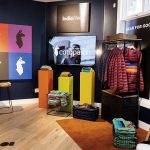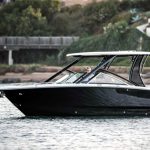Billabong International Limited reported a net loss after taxes of A$859.5 million ($883 mm) for the year ended June 30, after writing down the value of five of its brands to nil.
The Australian action sports company reported sales revenue fell 13.5 percent to A$1.34 billion, a decline of 12.6 percent in currency-neutral (c-n) terms compared with the previous comparable period.
The loss, however, was caused by A$867.2 million ($891 mm) of predominately non-cash charges the company took during the year to reflect the declining value of its brands and retail businesses. The bulk, or A$593.5 million ($610 mm) of those came from impairment charges taken on seven of the company’s 13 brands. The company reduced the carrying value of its flagship Billabong (surf apparel) brand, Element (skateboards), Palmers Surf, Beachculture (airport stores) and Amazon brands to zero, which basically means none of the business could be sold for a profit. Billabong also reduced the value of its Tigerlily (girl’s swimwear) and Dakine (board sports accessories) brands by 31.4 percent and 16.7 percent respectively. The values of Von Zipper (sunglasses), Kustom (footwear), and Honolua Surf Company (apparel) were unchanged, while Xcel (wetsuits), Sector 9 (skateboard) and RVCA (apparel) appreciated in value.
The company also took a non-cash charge of A$129.6 million ($133 mm) related to a complete write off of its majority stake in Nixon (watches and accessories), which it has since sold to a minority partner. The company wrote off real estate, fixture and fittings at 158 stores it closed during the period to the tune of A$32.6 million and took a provision for inventory and receivables losses of A$32.0 million.
Excluding the one-time charges and the results from Nixon, executives said Billabong generated adjusted EBITDAI of A$72.6 million ($75 mm), down $14.3 million in c-n terms from the corresponding period a year earlier.
Excluding the one-time charges and the results from Nixon, executives said Billabong generated adjusted EBITDAI of A$72.6 million ($75 mm), down $14.3 million in c-n terms from the corresponding period a year earlier.
“We are nearing the end of a long process that has caused distraction, impacted on staff morale and has been very costly,” said Billabong Chairman Dr Ian Pollard. “Liquidity has been secured and we are within weeks of finalizing our long term funding arrangements. (See BOSS 1334). The company looks forward to refocusing, reinvigorating its brands and rebuilding the business on a solid, long term financial footing.¨
Adjusted sales, or sales excluding Nixon results between July 1, 2011 and April 16, 2012, declined in all three geographic regions. In the Americas, adjusted sales declined by A$38 million, or 5.7 percent (5.6 percent c-n), to A$636.7 million, but adjusted EBITDAI increased 0.8 percent (0.6 percent c-n) as the company shifted distribution away from close out and distressed sales channels and towards more profitable channels, such as e-commerce.
Billabong directors said while it must still sell its Canadian retail chain West 49 and faces a period of rebuilding and reform, it does not expect to incur such large write offs going forward.
The company ended the fiscal year with net debt of A$207 million, up from A$161 million a year earlier and gross debt of A$320 million, plus obligations for deferred consideration on various acquisitions of A$58 million. Inventory was valued at A$266.8 million, down 9.0 percent from the end of fiscal 2012.
Since the June 30, Billabong has sold DaKine brand to Altamont Capital Partners for a cash price of A$70 million and sold back most of its stake in Nixon via a management LBO financed by Trilantic Capital Partners. That deal reduces Billabong’s obligation to buy Nixon products from $152 million to $9 million from 2014 to 2017.
As reported in S.E.W. last week, the company’s board is evaluating an eleventh hour financing proposal that could save it $143 million in interest payments compared with a package offered by a Altamont and a unit of GE Capital.
“We are soon to transition to a new capital structure and a new CEO who will be leading ongoing reform and rebuilding over the next 24 months,” the company said in its earnings statement. “Accordingly, the focus will be on sustainable restructuring and improvement rather than solely short term performance and accordingly we are not providing EBITDA guidance.”















